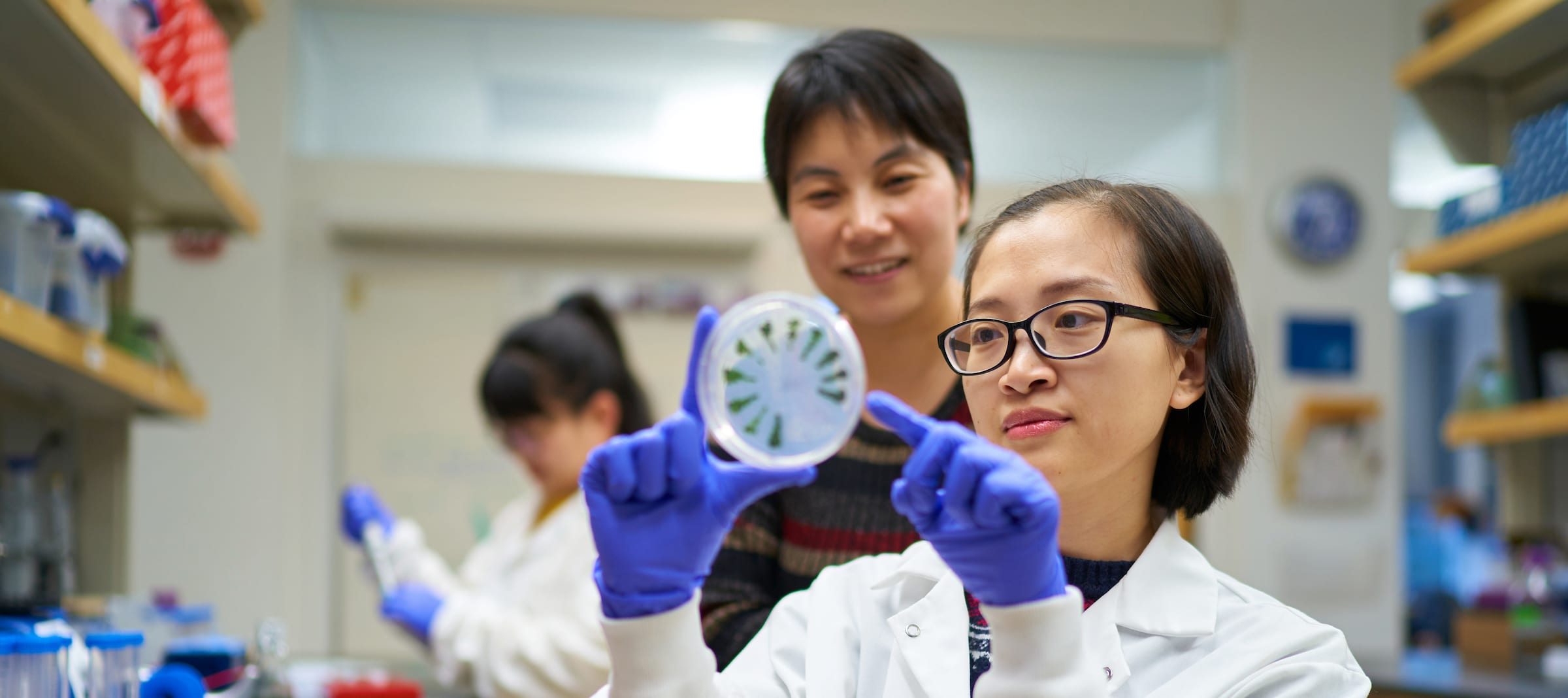Inspiring the Next Generation of Scientists
Our K-12 STEAM+Ag® programs and curricula aim to engage diverse students to explore STEM concepts. Through virtual laboratories, professional development training for teachers, and authentic research experiences, we are increasing the accessibility of plant science education opportunities. Our Education Research and Outreach Lab bases our outreach on cutting-edge research questions that continually increase our understanding of how students learn STEM.
Research Opportunities for High School Students
Are you a high school student passionate about STEAM and eager to gain hands-on research experience? Our High School Internship Program offers a unique opportunity to work alongside leading scientists at a world-class plant and agricultural research center. If you are at least 16 years old, this is your chance to explore the world of scientific discovery, develop critical research skills, and contribute to real-world research that impact agriculture and sustainability.
As an intern, you will:
✔ Conduct hands-on research by collecting and analyzing data
✔ Collaborate with a team of fellow interns and scientists
✔ Learn cutting-edge techniques used in agricultural and plant science
✔ Present and share your findings with the research community
Choosing Your Research Focus
Before applying, it is important to explore the diverse research conducted at the Danforth Center to ensure a strong alignment with your interests. On the application, you will be asked to list up to three labs that match your research interests and explain why you are drawn to them.
To get started:
- Explore Research Areas – Learn about the key scientific themes at the Danforth Center
- Meet Our Scientists – Review our list of Principal Investigators (PIs) to find labs that align with your interests
Things to Consider
Our research spans various scientific environments. Think about what setting excites you most:
- Wet Lab Research – Conducting experiments at a lab bench
- Field & Greenhouse Studies – Working with plants in natural and controlled environments
- Computational Science – Analyzing complex data using computer-based techniques
Many of our research projects incorporate a combination of these approaches. Reflect on what interests you the most and how you envision contributing to the field!
We look forward to receiving your application and welcoming the next generation of STEAM researchers!
The application period is February 1–March 1 each year.
Questions about high school internships? Contact Shannon Gabbert.
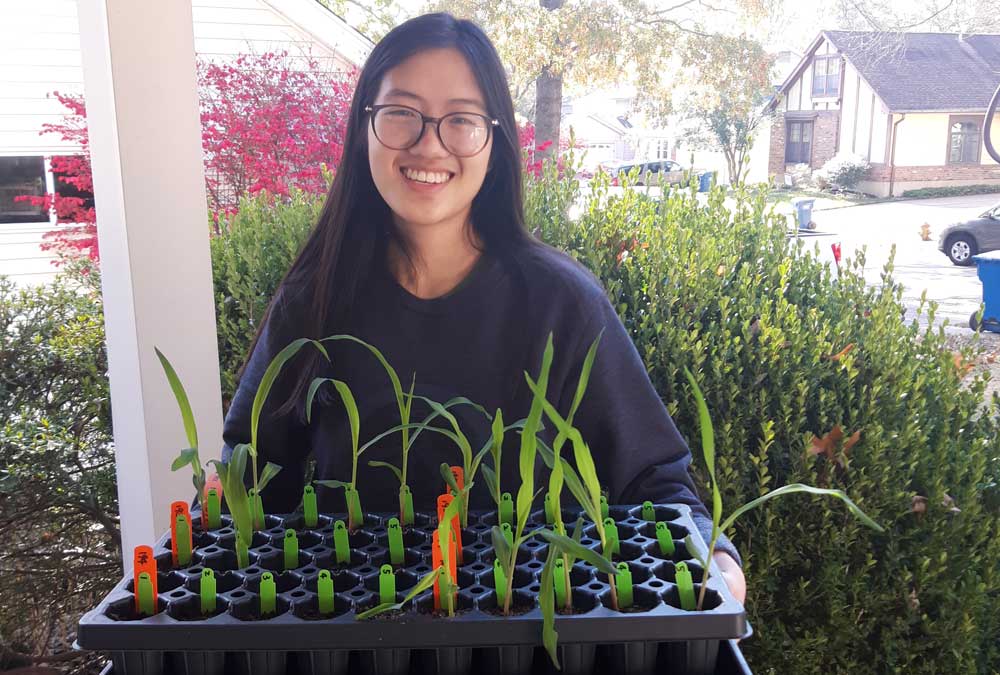
Authentic Research Experiences
Engaging student scientists in foundational research happening at the Danforth Center.
Authentic Research Experiences (AREs) engage student scientists in foundational research taking place at the Danforth Center that allow students to start to see themselves as future scientists. Students participate in the scientific process and learn science content, conduct experiments, interact with scientists, share data with Danforth research labs through student data portals, and disseminate their results at public and scientific events.
Mutant Millets
Research Question: What phenotypes benefit the growth and quality of Millets?
Did you know students contribute to foundational research happening at the Danforth Center? Our Mutant Millets program brings real science research into classrooms and allows students to begin engaging in the scientific process. In Mutant Millets, we focus on a plant called Setaria viridis, or green foxtail millet. While Setaria is often considered a weed, it is extremely valuable to scientific research. Not only is it related to an economically important plants like corn and sugarcane, but scientists have also sequenced its entire genome, making it useful for comparative genomics with cereal crops.
At the Danforth Center, scientists have over 3,000 different Setaria viridis mutant families. Mutant plants are those whose genetic make-up has been changed, and mutations help scientists identify and study the functions of genes. Through Mutant Millets, students can help our researches identify mutant traits in Setaria plants, and contribute to our scientific research.
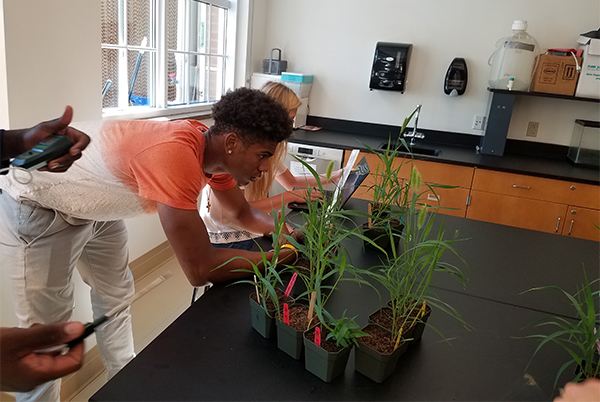
Mutant Millets equips teachers with professional development training, supplies, and laboratory-generated mutant seed populations of Setaria viridis for their students to grow in their classrooms to familiarize them with skills in scientific research. As data is collected, students will also input their findings that will be utilized by scientists at the Center.
Contact Ash Kass to get started with Mutant Millets.
Discovering Volvox Development
Research Question: What genes contribute to the understanding of the evolution of multicellularity using Volvox?
In our Discovering Volvox Development (DVD) program, middle and high school students can contribute to real scientific research happening at the Danforth Center. Through DVD, students will screen for development mutants in the green algae Volvox carteri. Volvox is a visually-engaging organism that students use for learning important lessons on the concept of organismal life cycles. Volvox is an experimentally tractable multicellular species with recently evolved germ and somatic cell types, which is under investigation in the laboratory of Danforth Center Principal Investigator Jim Umen to understand the origins of multicellularity.
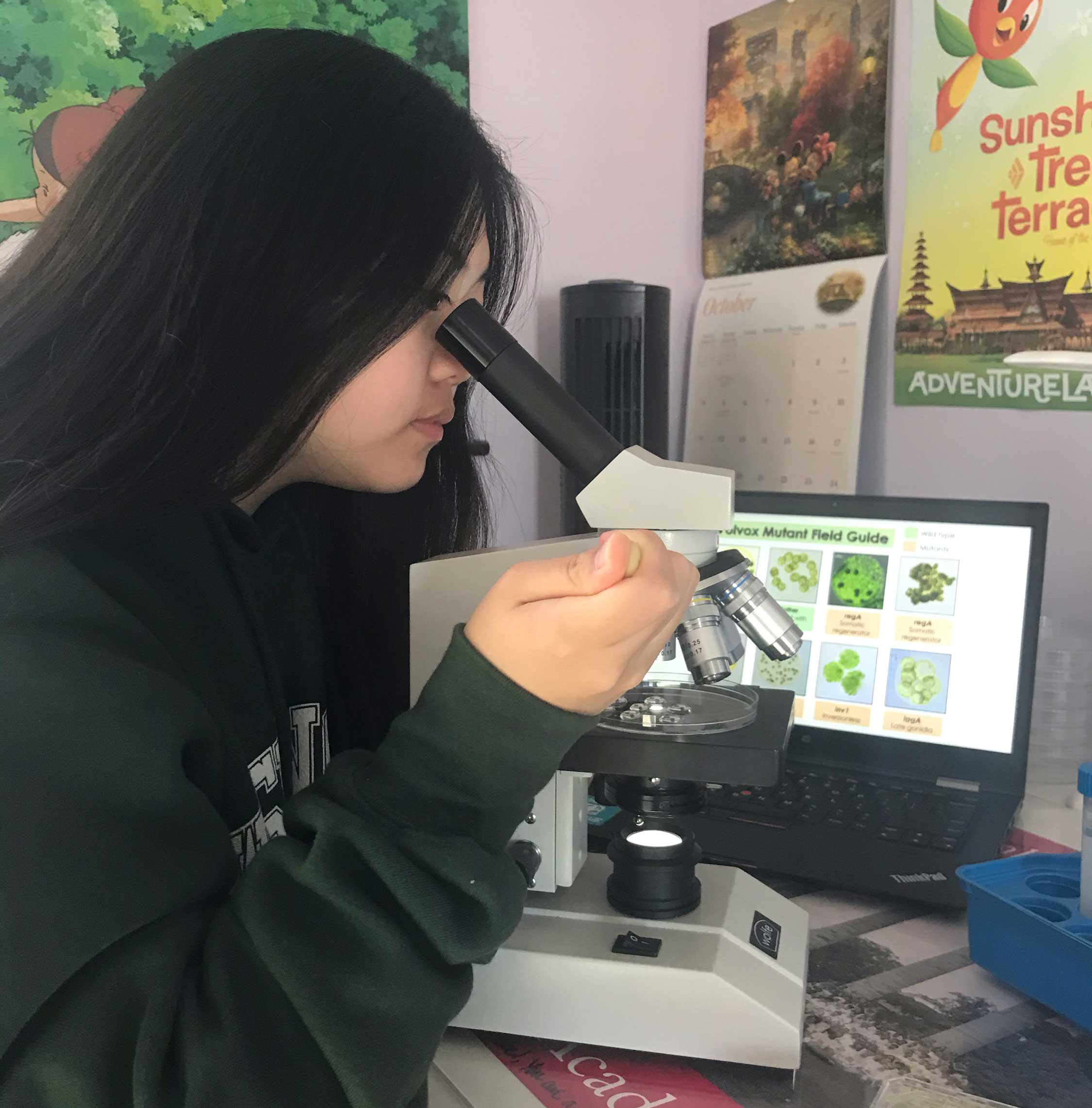
The highly-visual nature of Volvox makes scientific research exciting for students. It is also easily cultured and screened for mutants, making DVD a great opportunity for students to engage in an authentic research experience. Students document their contributions by uploading their data to the DVD website that provides updates on how their Volvox discoveries are being utilized in the laboratory. This program offers professional development to educators and supplies and support for classroom settings and for independent projects conducted at home by students.
Contact Ash Kass to get started with DVD.
Genotype to Phenotype
Research Question: How does the architecture of corn affect yield?
In this program, high school and college students can grow their own corn seedlings, learn ways to measure leaf angles, and contribute real data to the laboratory of Danforth Center Principal Investigator Andrea Eveland, Ph.D. Through this experience, teachers and students are trained in concepts of genetics as they relate to agriculture, food security, and data science.
Leaf angle in corn plants plays a role in determining plant density (how many plants can be grown per acre) and yield (the number of ears of corn that are produced per acre). In Dr. Eveland’s Lab, research is being conducted to identify genetic factors that regulate the variation in leaf angle. Through Genotype to Phenotype, students will grow corn seedlings of hundreds of corn genotypes and measure the leaf angles manually and through image analysis.
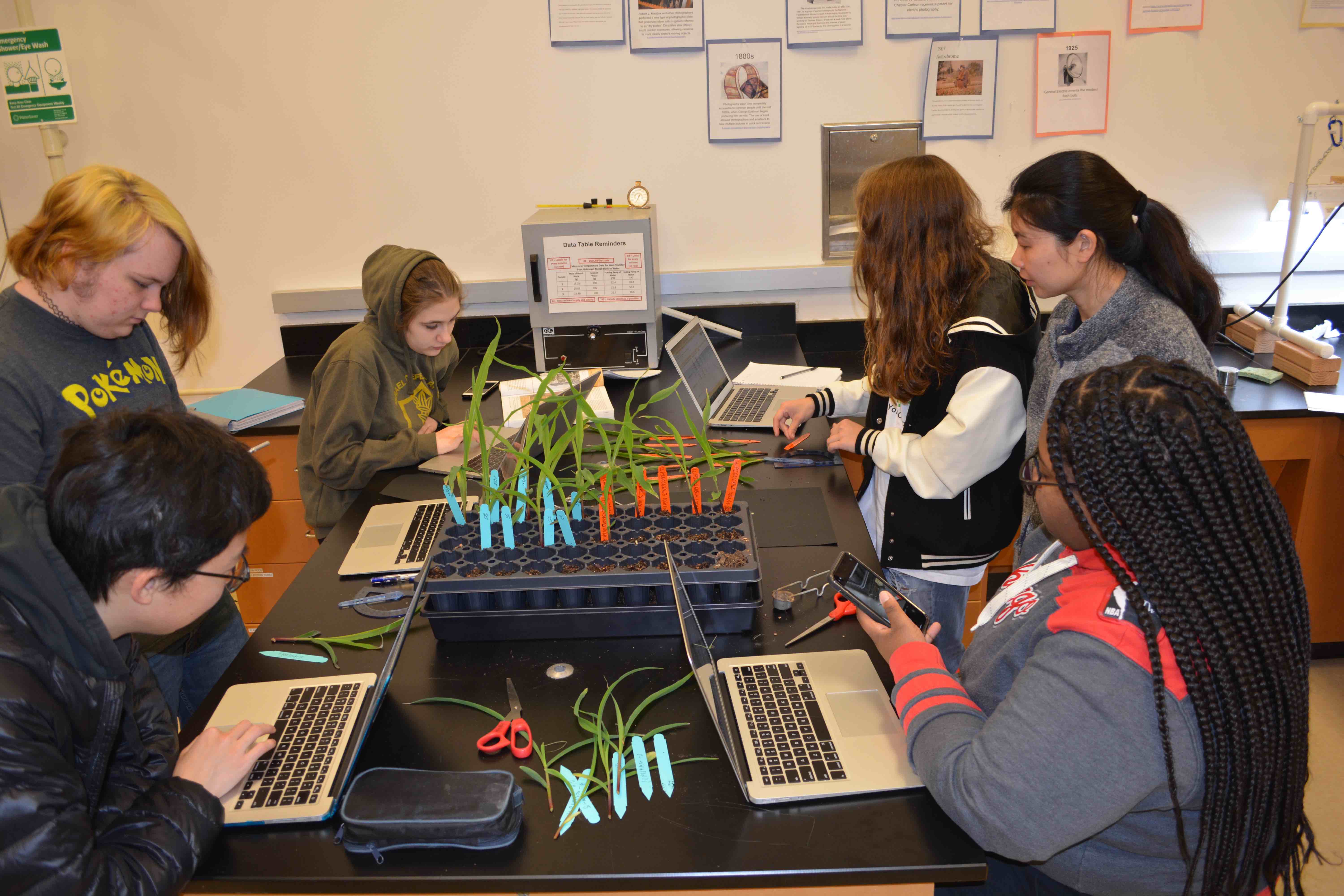
In a second exercise, students test for the presence of specific changes in the DNA of the corn plants in order to understand the correlation between these genotypic changes and the variation in the phenotypes (physical characteristics) of the plants. By screening hundreds of corn genotypes, students contribute molecular and phenotypic data that can help the Eveland lab develop predictive models to determine the leaf angle of an adult plant based on the seedling data.
Contact Ash Kass to get started with Genotype to Phenotype.
Plants Fight Back
Research Question: Can a peptide from legumes protect other plants as a fungicide from infection?
Fungal diseases such as wheat head scab, wheat rusts, rice blast and sheath blight, soybean rust, banana black sigatoka are a major threat to food security and food safety. Some fungal pathogens produce mycotoxins that pose a major threat to human and animal health. Fungal diseases cause 12-15% yield loss in crops. The fungicide market will be a 17 billion industry by 2022. Fungal resistance to fungicides and environmental damage are major global challenges. In this authentic research experience, students will learn about the ways in which plants fight off fungal pathogens and how this is important to global food production. Students will have the opportunity to observe the effect of antifungal peptides such as defensins and understand how these peptides work to fight off fungal pathogens without the use of synthetic fungicides.
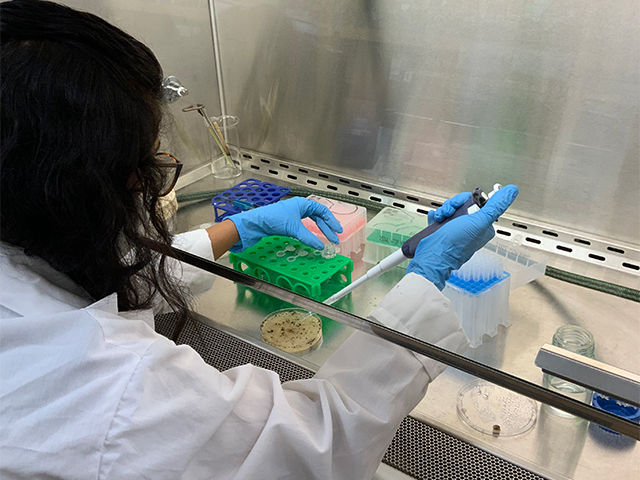
Contact Ash Kass to get started with Plants Fight Back.
Questions? Contact Us

Ash Kass
ARE/CURE Coordinator
Education Researcher and Program Manager
Education Technology
Using cutting-edge technology to inspire students to pursue STEM careers.
The Education Technology Program uses cutting-edge technology to engage and inspire students to pursue STEAM careers. Immersive educational experiences are offered through augmented and virtual reality, 3D modeling, computer gaming, and more, making science accessible to all.
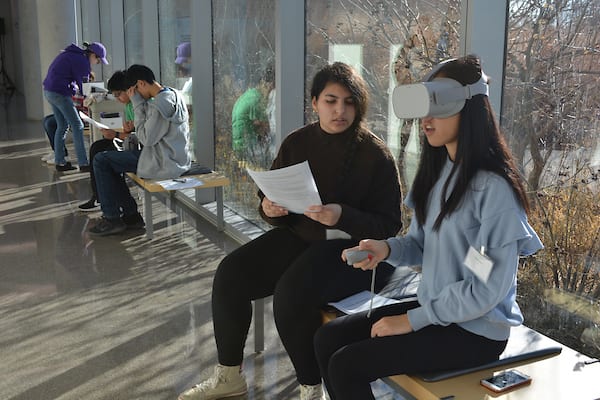
For more information contact Sandra Arango-Caro at:
sarango-caro@danforthcenter.org.
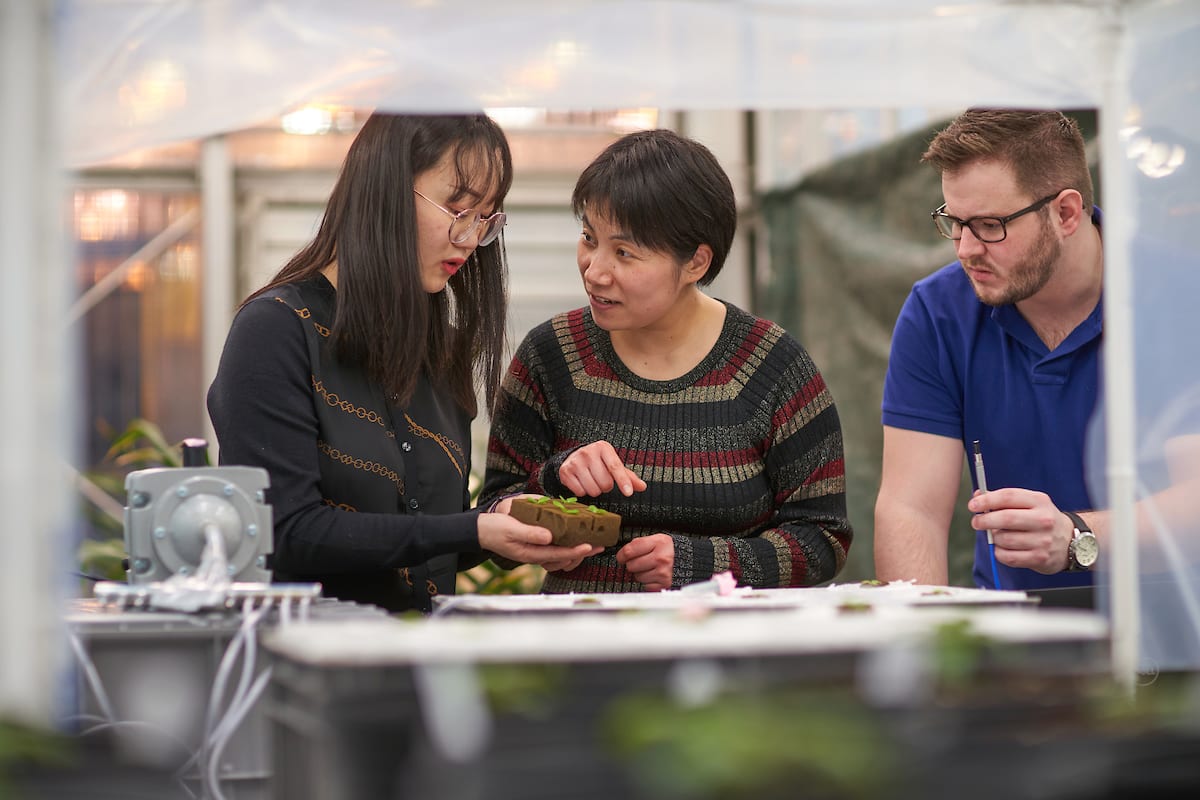
Undergraduate Research & Outreach
